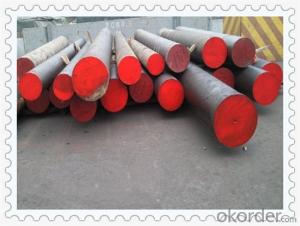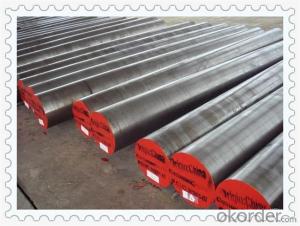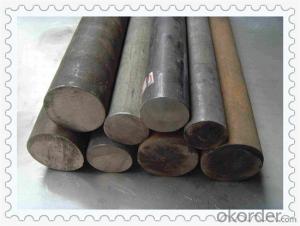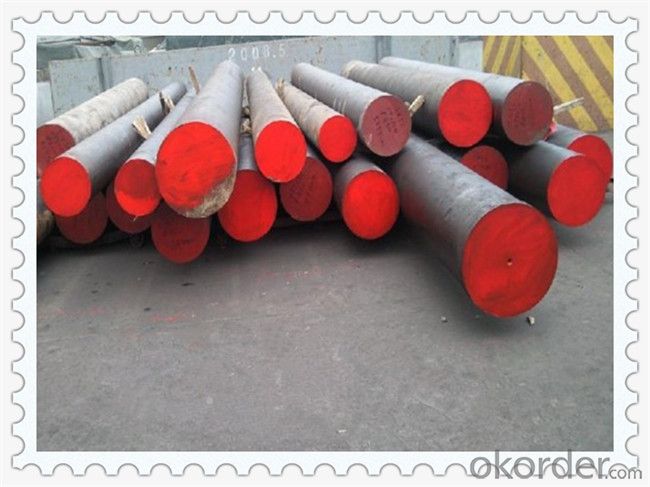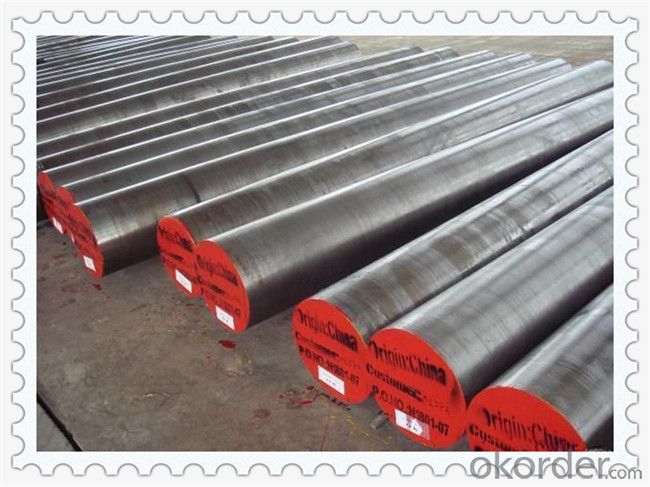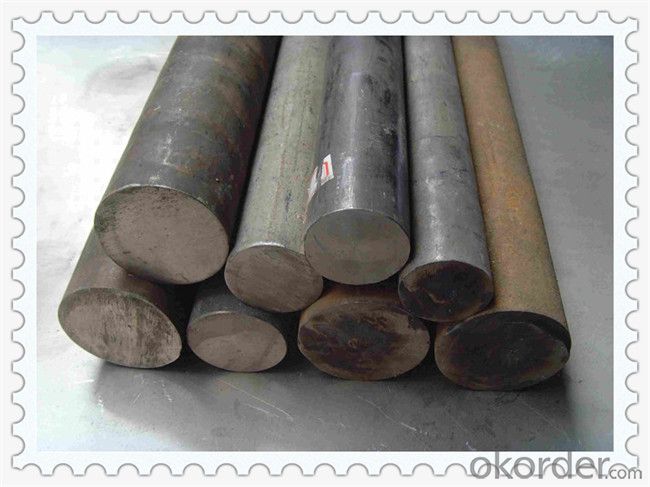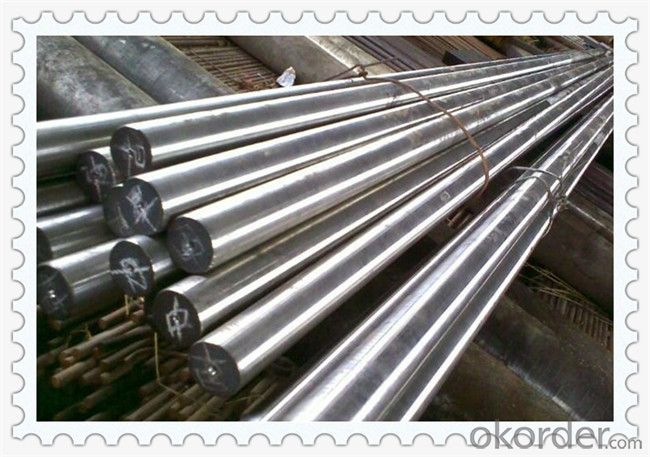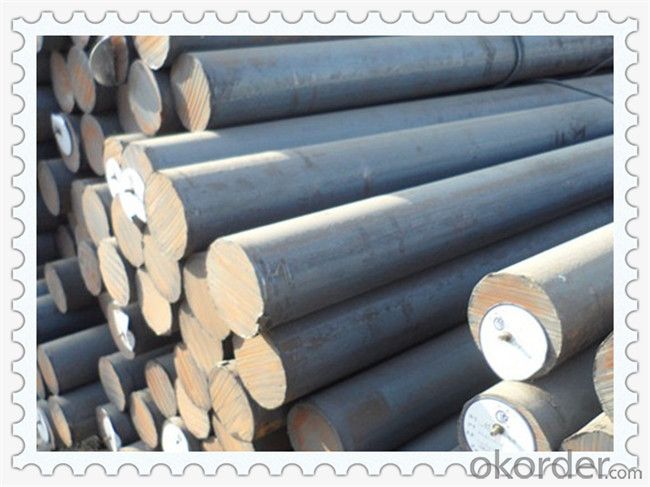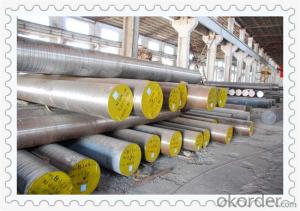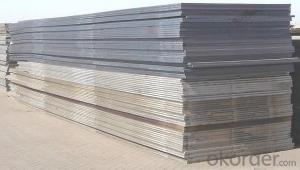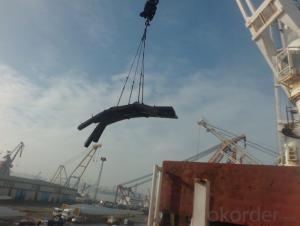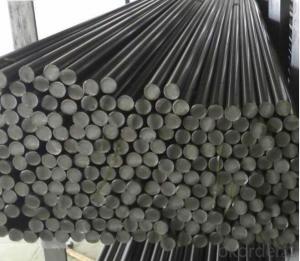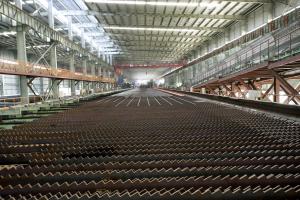Hot Rolled Alloy Carbon Structural Steel Bars
- Loading Port:
- China main port
- Payment Terms:
- TT OR LC
- Min Order Qty:
- 30 m.t.
- Supply Capability:
- 10000 m.t./month
OKorder Service Pledge
OKorder Financial Service
You Might Also Like
Hot Rolled Alloy Carbon Structural Steel Bars
Products Details
Product Name | Alloy Steel 1.2379 |
Standard | ASTM A689, JIS G4801, DIN 17221, GB/T 18254, ASTM A295, JIS G4805, etc. |
Spring steel | 65Mn, 1566, 60Si2Mn, 9260, etc. |
Bearing steel | GCr15, SAE52100, GCr15SiMn, 100CrMnSi6-4, SJU2, etc. |
Cold heading steel | ML25, ML35, etc. |
Alloy structural steel | 40CrNiMo, SAE4330, 42CrMo, 15Cr2Ni2, 40CrNi2Mo, 35CrMoV, 12Cr1MoV, ASTM4130, SCM420, 40CrV, etc. |
Military steel | 20Cr2Ni4A, 18Cr2Ni4WA, 23CrNiMo7-4-7, etc. |
Heat resistant steel | 5CrNiMoV, 4Cr10Si2Mo, etc. |
Mold and tool steel | SKD62, Cr12, 31CrMoV9, H11, 4Cr5MoSiV1, SKD61, DIN1.2344, H13, 35CrMoV, Cr12Mo1V1, SKD11, X153CrMoV12, D2, O1, DIN1.2510, P20, DIN1.2311, 3Cr2Mo, 9CrWMn, 4Cr13, AISI420, DIN1.2083, Cr12MoV, DIN1.2601, P20+Ni, Cr8Mo2SiV, DC53, DIN1.2738, etc. |
Gear steel | ASTM8620, SAE4340, SNCM430, 40CrNiMo, etc. |
Size | Round bar: 15-1200mm Square bar: 80-800mm |
Length | 2-12m, as customers' requirement. |
Melting process | EAF+LF+VD |
Ultrasonic testing | SEP1921-84 C/C, D/D, E/E |
Surface treatment | Black, grinded, peeled, polished are available |
Delivery condition | Annealing, tempering, quenching + tempering |
Technique | hot rolled, cold drawn, forged are available |
Package | Standard seaworthy packing, as customers’ requirement |
Delivery Time | 30 days after receipt of the deposit, negotiable. |
Available Sizes
Grade | Size (mm) | ||||
Round rolled steel (Dia.) | Flat rolled steel | Round forged steel (Dia.) | Square forged steel | Bright bar (Dia.) | |
High-quality carbon structural steel | 16-320 | 5-38 44-150 | 120-900 | 100-750 | 12-150 |
Alloy structural steel | 16-320 | 5-38 44-150 | 120-900 | 100-750 | 12-150 |
Carbon tool steel | 16-320 | 5-38 44-150 | 120-350 | 100-310 | 12-150 |
Alloy tool steel | 30-90 | 100-900 | 100-750 | 12-150 | |
High speed tool steel | 80-120 | 80-110 | 12-150 | ||
Bearing steel | 16-320 | 5-38 44-150 | 120-300 | 100-600 | 12-150 |
Spring steel | 14-180 | 5-38 44-150 | 120-300 | 100-260 | 12-150 |
Stainless steel | 16-250 | 120-750 | 120-600 | 12-150 | |
High temperature alloy steel | 55-200 | 80-200 | 12-150 | ||
Free-cutting steel | 14-250 | 120-400 | 12-150 | ||
Gear steel | 16-320 | 5-38 44-150 | 120-900 | 15-150 | |
Products Show
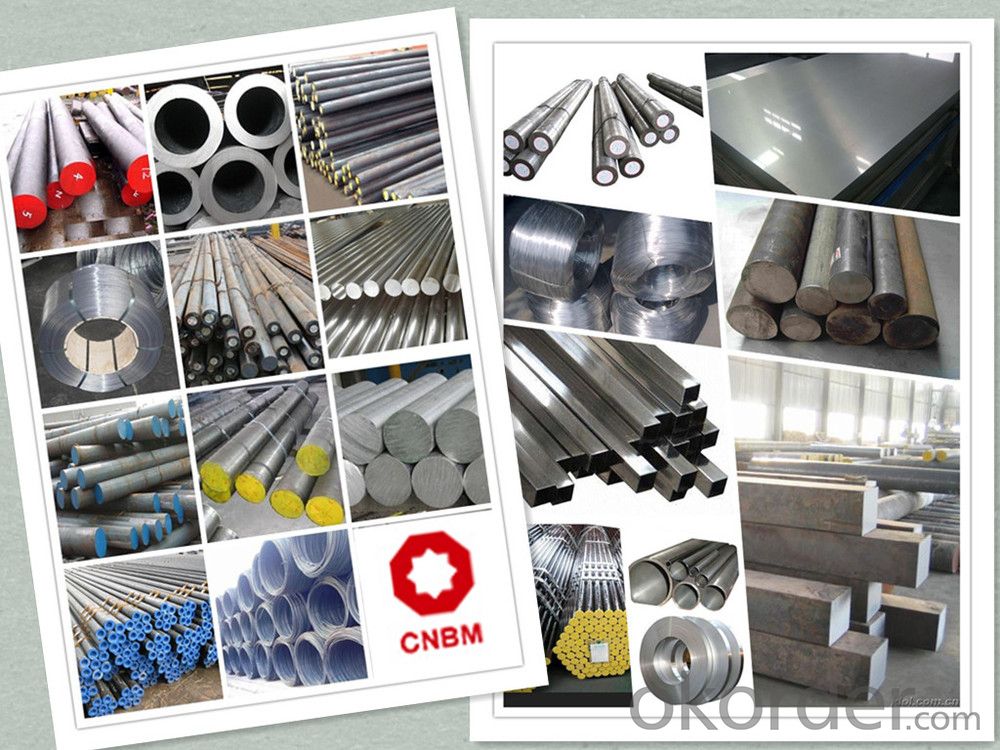
Product Overviews
| Product Name | Typical Grades | Diameter(mm) | Standard adopted |
| Carbon Steel | 20 (1020/S20C/C22) | Ø16-Ø300 |
GB/SAE/JIS/DIN
|
| 40 (1040/S40C/C40) | |||
| 45 (1045/S45C/C45) | |||
| Bearing Steel | GCr9 (51100/SUJ1) | Ø12-Ø250 | |
| GCr15 (52100/SUJ2/100Gr6) | |||
| GCr9SiMn (A485-Gr.1/SUJ3) | |||
Cr-Mo Steel | 20Cr (5120/SCr420H/20Cr4) | Ø12-Ø250 | |
| 40Cr (5140/SCr440/41Cr4) | |||
| 42CrMo(4140/SCM440/42CrMo4) | |||
| Gear Steel | 20CrNiMo | Ø16-Ø600 | |
| 20CrMn(5115/SMnC420/20MnCr5) | |||
| 20CrNiMo(8620/SNCM220/20CrMiMo2) |
Application
| Carbon Steel | Mold bottom, Plastic mold, Construction machinery parts Automobile parts, Security grills, Screens, Construction |
| Bearing Steel | Aerospace, Navigation, Nuclear energy, Chemical industry Electronic information, Petrochemical, Instrument and meter Transportation |
| Cr-Mo Steel | Mechanism & Fasteners gear, Stressed components for vehicles Engines and machines, Parts of larger cross-section |
| Gear Steel | All kinds of gears, Statically and dynamically stressed component for vehicles Engines and machine, Larger cross-section parts, Crankshafts |
Work Shop
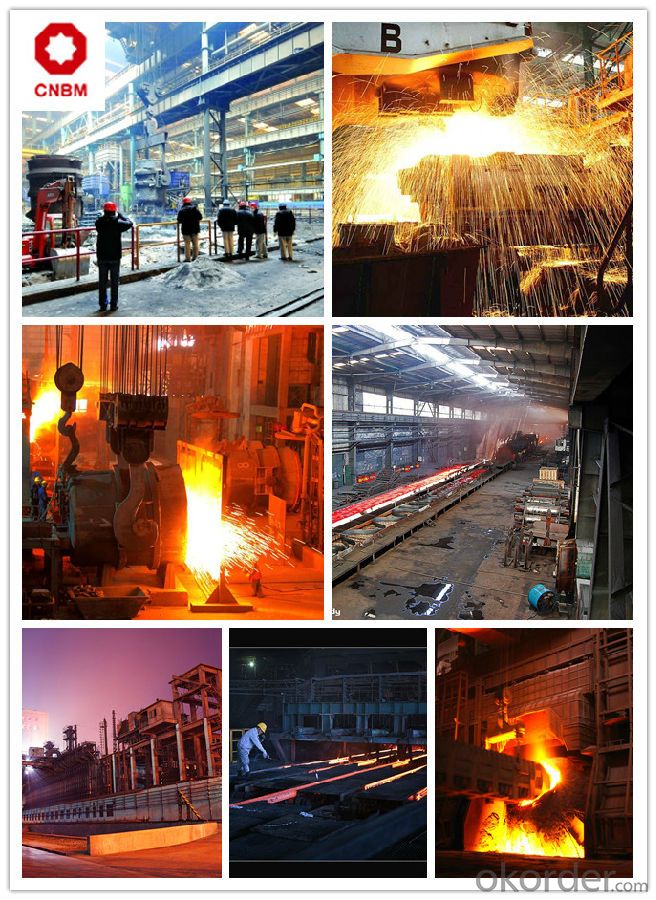
Company Information
CNBM International Corporation is the most important trading platform of CNBM group.
Whith its advantages, CNBM International are mainly concentrate on Cement, Glass, Iron and Steel, Ceramics industries and devotes herself for supplying high qulity series of refractories as well as technical consultancies and logistics solutions.

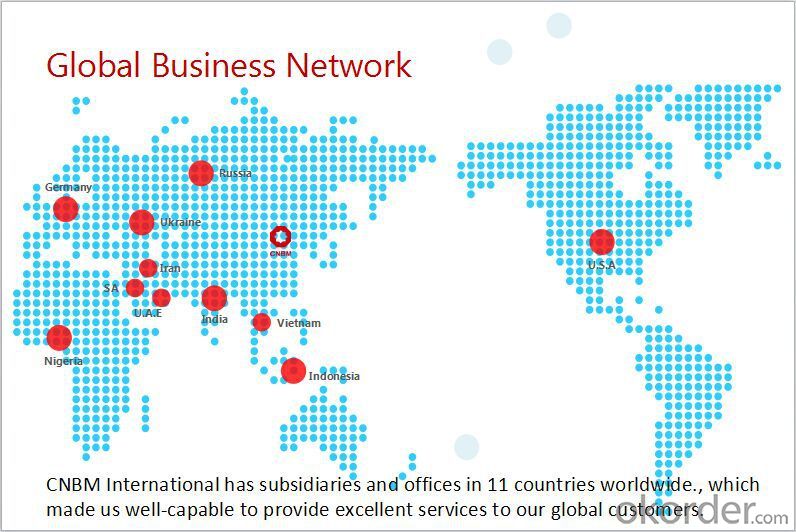
FAQ
1, Your advantages?
professional products inquiry, products knowledge train (for agents), smooth goods delivery, excellent customer solution proposale
2, Test & Certificate?
SGS test is available, customer inspection before shipping is welcome, third party inspection is no problem
3, Factory or Trading Company?
CNBM is a trading company but we have so many protocol factories and CNBM works as a trading department of these factories. Also CNBM is the holding company of many factories.
4, Payment Terms?
30% TT as deposit and 70% before delivery.
Irrevocable L/C at sight.
5, Trading Terms?
EXW, FOB, CIF, FFR, CNF
6, After-sale Service?
CNBM provides the services and support you need for every step of our cooperation. We're the business partner you can trust.
For any problem, please kindly contact us at any your convenient time.
We'll reply you in our first priority within 24 hours.
Packaging & Delivery
1, Packaging: seaworthy package or as required
2, Delivery: 35-45 days or based on quantity
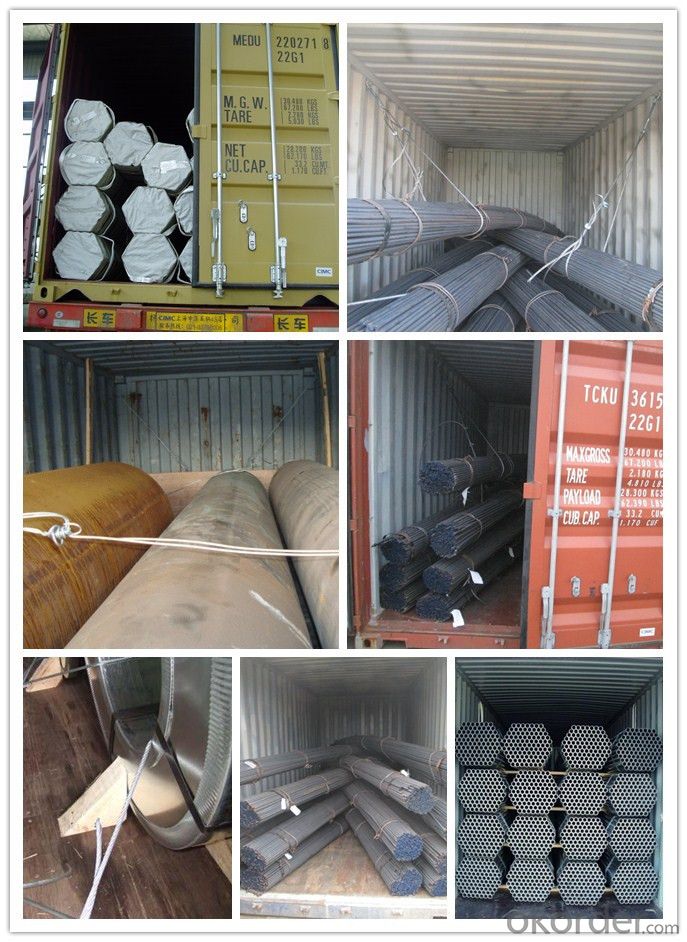
- Q: Are steel round bars corrosion resistant?
- Steel round bars are not inherently resistant to corrosion. This is because steel is mainly composed of iron, and iron tends to rust when it comes into contact with moisture and oxygen. Nevertheless, there are specific types of steel that have been engineered to resist corrosion. These types, including stainless steel, consist of added alloying elements such as chromium and nickel. These elements create a protective layer on the surface of the steel, which prevents rust and corrosion. Therefore, although standard steel round bars lack corrosion resistance, stainless steel round bars offer a corrosion-resistant alternative.
- Q: Can steel round bars be used in the manufacturing of shafts?
- Yes, steel round bars can be commonly used in the manufacturing of shafts. Steel round bars possess excellent strength, durability, and resistance to wear and tear, making them ideal for shaft applications. Additionally, their round shape allows for easy machining and shaping into the desired dimensions and specifications required for shafts.
- Q: What is the tolerance level for steel round bars?
- The tolerance level for steel round bars can vary depending on several factors such as the grade and diameter of the bar, as well as the specific industry standards and requirements. Generally, the tolerance level for steel round bars is specified in terms of diameter or diameter deviation. For example, in the manufacturing industry, the tolerance level for steel round bars can be specified as a specific diameter range, such as +/- 0.001 inches or +/- 0.02 millimeters. This means that the actual diameter of the bar should be within this specified range to meet the tolerance requirements. Additionally, the tolerance level can also be specified in terms of diameter deviation, which refers to the difference between the actual diameter of the bar and the specified nominal diameter. This deviation is usually expressed as a percentage or a specific measurement, such as +/- 0.5% or +/- 0.010 inches. It is important to note that the tolerance level for steel round bars can be more stringent in certain industries, such as aerospace or automotive, where precision and quality are critical. In these cases, the tolerance requirements may be narrower to ensure the bar meets the specific performance and safety standards. Ultimately, it is essential to consult the relevant industry standards, specifications, or customer requirements to determine the specific tolerance level for steel round bars in a particular application.
- Q: Are steel round bars suitable for welding applications?
- Steel round bars are a great choice for welding. They are commonly used in welding applications because they are strong and durable. You can easily weld them to other steel components or structures using different welding processes like arc welding, MIG welding, or TIG welding. Steel round bars also have good mechanical properties, including excellent tensile strength. This makes them suitable for welding applications where strength and load-bearing capacity are important. They come in various sizes and grades, so you can use them for different welding projects. However, it's important to choose the right type of steel round bar for your specific welding application and desired final product properties.
- Q: Can steel round bars be used for making turbine blades?
- Using steel round bars to make turbine blades is not possible. Turbine blades experience high temperatures and extreme forces, so they need to be durable and flexible. Steel round bars do not have the required properties to endure these conditions. Usually, turbine blades are constructed from materials like titanium alloys or advanced composites, which have a high strength-to-weight ratio, exceptional fatigue resistance, and thermal stability. These materials are purposely designed to withstand the challenging conditions of turbine operations, ensuring efficiency and reliability.
- Q: What are the different types of surface defects in steel round bars?
- Steel round bars can have different types of surface defects, which can vary in severity and affect the quality and performance of the bars. Common surface defects include: 1. Scale: During manufacturing, an oxide layer called scale can form on the surface of the steel. Scale appears as a rough, flaky layer and negatively affects the bar's appearance and surface finish. 2. Pits: Small depressions or cavities can occur on the bar's surface due to corrosion, mechanical damage, or manufacturing defects. Pits weaken the bar's structural integrity and increase the risk of failure. 3. Scratches: Shallow grooves or marks can be caused by handling, transportation, or contact with other objects during manufacturing. While scratches may not significantly impact the bar's strength, they do affect its appearance and surface finish. 4. Cracks: Linear fractures on the bar's surface can result from excessive stress, thermal cycling, or manufacturing defects. Cracks are extremely harmful to the bar's strength and integrity and can lead to catastrophic failure if not addressed. 5. Decarburization: Loss of carbon from the steel bar's surface layer, which can occur during heating or cooling processes. This process results in a softer and weaker surface layer, reducing the bar's overall strength and durability. 6. Lamination: Separation or delamination of layers within the steel bar, caused by improper bonding or rolling conditions during manufacturing. Lamination weakens the bar's structural integrity and increases the likelihood of failure. 7. Inclusions: Non-metallic particles or impurities present on the bar's surface, caused by contaminants in raw materials or improper manufacturing processes. Inclusions negatively impact the bar's mechanical properties and performance. To ensure the quality and performance of steel round bars, it is crucial to identify and address these surface defects. Various inspection and testing methods can be used, such as visual inspection, ultrasonic testing, magnetic particle inspection, and dye penetrant inspection.
- Q: How do steel round bars compare to copper round bars?
- Different applications call for distinct properties in steel and copper round bars. To begin with, steel round bars are known for their remarkable strength and durability. This versatile material can withstand high levels of stress, making it perfect for structural and industrial uses. With its high tensile strength, steel can resist pulling forces without breaking. Construction projects, automotive components, and machinery manufacturing frequently rely on steel round bars. On the other hand, copper round bars possess unique characteristics that set them apart from steel. Copper is an exceptional conductor of heat and electricity, making it indispensable in electrical wiring and plumbing systems. Its high resistance to corrosion makes copper pipes widely used in plumbing applications. Additionally, copper's antimicrobial properties make it a preferred material for medical equipment and food processing industries. When it comes to cost, steel round bars tend to be more affordable than copper round bars. Steel is abundantly available and has lower production costs compared to copper. This cost advantage makes steel a popular choice for budget-conscious applications. In terms of appearance, steel round bars have a sleek, metallic finish, while copper round bars exhibit a distinct reddish-brown appearance. This visual distinction often influences the selection of materials in architectural and decorative applications. In summary, steel round bars and copper round bars possess different properties that suit them for specific purposes. Steel offers exceptional strength and durability, making it suitable for structural and industrial applications. Copper, on the other hand, is valued for its conductivity, corrosion resistance, and antimicrobial properties, making it ideal for electrical, plumbing, and medical applications. The choice between steel and copper depends on the specific requirements of the project and the desired properties of the material.
- Q: What is the difference between hot-rolled and cold-rolled steel round bars?
- The manufacturing process is the primary factor that distinguishes hot-rolled and cold-rolled steel round bars, giving rise to distinct physical and mechanical properties. Hot-rolled steel round bars are formed by subjecting a billet or ingot to extremely high temperatures, usually above 1700°F (926°C). This allows the steel to become malleable and easily shaped. The process involves passing the heated steel through large rollers, which gradually decrease the diameter and increase the length. Consequently, hot-rolled bars have a rough, scaled surface with rounded edges. The rapid cooling that follows also creates an oxide layer or mill scale on the surface. In contrast, cold-rolled steel round bars are produced by rolling the steel at room temperature or slightly below. This method offers greater control over the dimensions and surface finish of the bars. The process entails passing the steel through smaller rollers, which exert high pressure to shape and compress the material. As a result, cold-rolled bars have a smoother and more precise surface finish, with sharper edges compared to their hot-rolled counterparts. Furthermore, since the steel is not subjected to high temperatures, it retains its strength and hardness properties. The differing manufacturing processes lead to variations in the mechanical properties of hot-rolled and cold-rolled steel round bars. Hot-rolled bars typically have a higher yield strength and are generally more ductile, making them suitable for applications that involve extensive shaping or bending. On the other hand, cold-rolled bars have a higher tensile strength and are generally harder, making them suitable for applications that require greater strength and dimensional accuracy. In conclusion, the key distinctions between hot-rolled and cold-rolled steel round bars arise from the manufacturing process, resulting in differences in surface finish, dimensional accuracy, and mechanical properties. The choice between the two depends on the specific requirements of the intended application.
- Q: What is the difference between a seamless and a turned steel round bar?
- The manufacturing process and resulting characteristics distinguish a seamless steel round bar from a turned steel round bar. To produce a seamless steel round bar, a solid steel billet is pierced, typically through hot rolling. This creates a hollow tube-like structure that is then elongated and shaped into the desired round bar form. The absence of welded joints or seams along its length gives the seamless bar a smooth and continuous surface. This manufacturing method improves the overall strength and durability of the round bar. In contrast, a turned steel round bar begins as a solid steel bar obtained through casting or hot rolling. The bar undergoes a machining process called turning, where it is rotated against a cutting tool to remove material and achieve the desired dimensions and shape. This turning process results in a round bar with a smooth and polished surface. However, there may be mill marks or slight imperfections due to the machining process, unlike a seamless round bar. Seamless steel round bars are often preferred in industries that require high strength and reliability, such as construction, automotive, and oil and gas. Their uniform structure and absence of welds make them highly resistant to cracking and failure under heavy loads or extreme conditions. On the other hand, turned steel round bars are commonly used in applications where a smooth surface finish is desired, such as decorative pieces or precision components for machinery. In summary, the main difference between a seamless and a turned steel round bar lies in their manufacturing process and resulting characteristics. While both provide a smooth surface finish, seamless round bars offer enhanced strength and reliability due to their seamless structure, whereas turned round bars are often chosen for their precise dimensions and aesthetic qualities.
- Q: What are the different shapes available for steel round bars?
- The different shapes available for steel round bars include round, square, hexagonal, and flat.
Send your message to us
Hot Rolled Alloy Carbon Structural Steel Bars
- Loading Port:
- China main port
- Payment Terms:
- TT OR LC
- Min Order Qty:
- 30 m.t.
- Supply Capability:
- 10000 m.t./month
OKorder Service Pledge
OKorder Financial Service
Similar products
Hot products
Hot Searches
Related keywords
